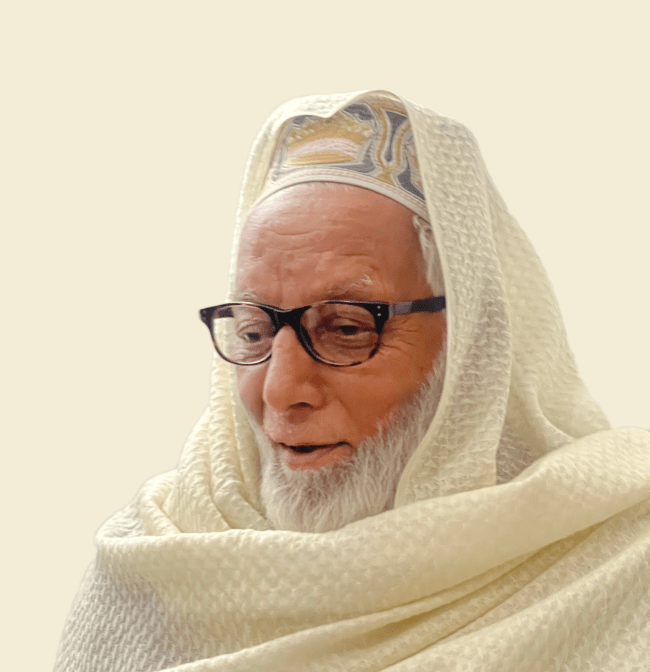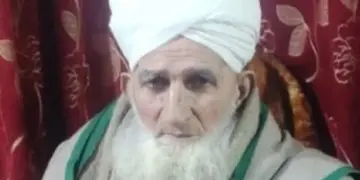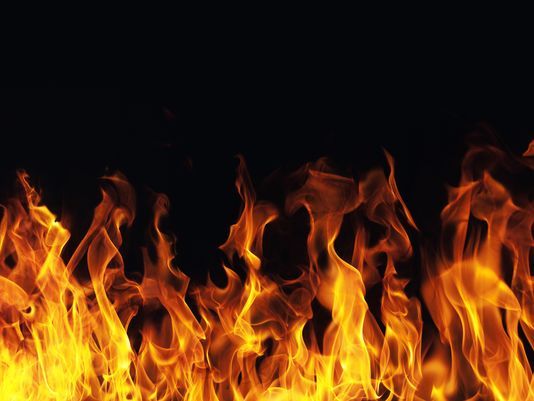By Sarwar Kashani, a grieving but proud son of one of the greatest sons of the soil
 Syed Muzaffar Kashani, known to the world and lovingly called Papa Ji by his family and all who admired him, was the unwavering rock fathers often stand by their children. But my rock, once so solid and steadfast, slipped away on January 2, 2024, leaving me shaken and painfully awake to the reality of his absence. Now, I feel utterly lost, standing before the steep mountain of life I must climb without the steady hand of Papa Ji to hold and guide me.
Syed Muzaffar Kashani, known to the world and lovingly called Papa Ji by his family and all who admired him, was the unwavering rock fathers often stand by their children. But my rock, once so solid and steadfast, slipped away on January 2, 2024, leaving me shaken and painfully awake to the reality of his absence. Now, I feel utterly lost, standing before the steep mountain of life I must climb without the steady hand of Papa Ji to hold and guide me.
As I wrestled with grief and mourning, a journalist friend texted a verse, which Alama Iqbal (RA) had written as an elegy for his mother, to express solidarity and underscore the stark reality I faced—a hollowed-out homeland where no one would anxiously await my messages anymore.
Kis ko ab ho ga watan mein aah! mera intizar
kon mera khat na aane se rahe ga be-qarar
The void left behind is immeasurable. The hope that thrived with his presence has turned into despair, for Papa Ji was like a living GPS—a modern way to describe his unwavering care and concern for all of us in the family and beyond. When I was away, even for work, he made it a point to check on my whereabouts almost every hour. He wouldn’t start laying the dining spread until everyone was home, ensuring that the entire family ate together. His devotion to togetherness was a cornerstone of our lives, now profoundly missed.
When I was away from home in Kashmir, working in my office in Delhi, he always made sure I shared how my day went and if I faced any difficulties or challenges at work. Simply narrating my problems to him seemed to make them disappear. He would strengthen my faith in Allah and remind me to submit to His will. “Alhamdulillah ala kuli haal“—praise be to Allah in every circumstance—was his constant catchphrase, one that eased even my greatest worries.
With Papa Ji now reunited with his Creator, I find myself yearning for that connection in his absence, overwhelmed by the profound weight of his loss. I keep waiting for my phone to ring, hoping to see “Papa Ji calling” flash on the screen. I wish I could dial his number and share with him the deepest pain of my life—the greatest tragedy I have faced so far in not finding him around.
Even in the depths of my sorrow, I am reminded of his wisdom, which now feels like a guiding light in the darkness. A reminder of his life and teachings, and suddenly I find peace. Alhamdulillah ala kuli haal.
In the passing of my compassionate and kindhearted father, it wasn’t just me who lost Papa Ji. He was deeply sympathetic to anyone who sought his help, extending the same care and concern to friends and relatives alike. With his unique blend of spiritual insight and worldly wisdom, he offered guidance that helped others navigate their challenges. His greatest joy came from seeing people return to him with smiles, sharing how his advice had resolved their difficulties.
This is what made his life a golden page in the scroll of the vast existence of all hues — a life that stood out with its profound impact. For me and those close to him, Papa Ji represented a grand narrative of life, intricately woven with a harmonious balance of worldly and spiritual wisdom. His entire life was a lesson in that balance, navigating both the material demands of the world and the deeper needs of his soul.
Kashani Sahib, as he was reverently known, was born into a family of traders and craftspeople in the Khwaja Bazar area of downtown Srinagar. His father, Syed Hussain Shah Kashani, though deeply spiritual, was not formally educated but had an exceptional talent for business and craftsmanship—a trait shared by his wife, who had never attended school.
Despite their modest backgrounds, they raised their eldest son with great care, ensuring he received the best possible education. Papa Ji began his professional journey as a school teacher before transitioning to a distinguished career in broadcasting.
He became a household name as Syed Muzaffar Kashani, captivating listeners with his magical tone and tenor that echoed for decades through Radio Kashmir, a dominant broadcasting medium that reigned supreme as the primary source of education, information, and entertainment.
Briefly involved in Kashmir politics through the Plebiscite Front, he parted ways with it in 1972, disillusioned by the front’s dissolution and the inconsistency of Kashmiri politicians. Yet, he would deeply lament the unfulfilled dream of Kashmir as a nation that never came to be his lifetime.
Guided by Principles: Papa Ji’s Wisdom on Life, Duty, and Faith
Papa Ji lived a life guided by his principles and terms, shaped by the wisdom of his spiritual guide, Syed Meerak Shah Kashani (RA). He did not renounce the world or his duties to family, relatives, neighbours, colleagues, friends, and benefactors. A devout follower of two of the most important aspects in a life of a Muslim – Huqooq ul Allah (the duties we owe to Allah) and Huqooq ul Ibad (the duties we owe to mankind). He emphasized these as essential to complete their faith, and always insisted that performing obligatory prayers, paying zakat, and fasting were not enough to fulfill our duties as Muslims, nor would they only guarantee our place in Jannah. While neglecting Huqooq ul Allah may be forgiven by Allah, neglecting Huqooq ul Ibad could only be forgiven by the person whose rights had been disregarded.
Yet, he never belonged to this world or sought its fleeting pleasures. To him, life was a time-bound trap, and the path to true success and happiness lay in unlocking the qualities Allah has ordained for us in the Quran. He often said that life should be lived in a way that you are present enough to make it meaningful but not so consumed by it that you forget the eternity that lies beyond. He would often philosophize that life is hard, while death is as easy as the morning breeze in the garden of existence, echoing Allama Iqbal’s words:
Kitni Mushkil Zindagi Hai, Kis Qadar Asan Hai Mout
Gulshan-e-Hasti Mein Manind-e-Naseem Arzan Hai Mout.
Embracing Mortality: Papa Ji’s Reflections on Life, Death
Yet, this never meant a desire for death. He would say that death is simply a release from the struggles of earthly existence—an inevitable truth that calls for acceptance, reminding us of life’s fleeting nature. According to him, every life, no matter how brief, leaves a mark. But death, however tumultuous it may seem, is the ultimate truth that exposes the falsity of worldly existence. That’s why Papa Ji would constantly remind us about the day he would be gone, explaining what he would like us to do when he breathed his last and after. He had already chosen and marked the place where he wished to be laid to rest for eternity—just near the feet of his beloved parents in our ancestral graveyard.
This was a testament to his deep reverence for family bonds and his enduring connection to his roots.
His talk of death would often irritate, scare, and unsettle me, as it did most of us. I never liked hearing about his death and, on several occasions, expressed my displeasure and fear of a life without him. But he would remain unfazed, saying that death is inevitable, and that we, including his life partner of more than 50 years, must be ready for that day. He would add that the fear of that day reflects a flaw in our basic belief system.
The Final Journey: Papa Ji’s Wishes, Faith, and the Road to Kashmir
My unwillingness to embrace his way of preparing me for that inevitable moment changed nothing. When the time came, I felt like an ostrich, burying my head in the sand to escape reality. On December 27, a rainy Friday, our world turned upside down. That morning, Papa Ji had performed his obligatory Friday bath, donned freshly washed clothes, and applied scent before heading to the midday congregational namaz. He looked unusually radiant, exuding a strength and splendor that were hard to miss, his neatly brushed white beard adding to his striking appearance.
After returning from the masjid, he completed his additional sunat and nawafil prayers at home. When we asked if lunch should be served, he replied, “Please go ahead and serve; I will join you soon,” and reclined on the bed, scrolling through his cellphone. My Maa served lunch, and we called Papa Ji again to join us. “You please start, I am coming,” he assured us. A few seconds later, someone went to check on him again. This time, he got up from the bed but couldn’t step out of it.
I watched in horror as his strength seemed to drain from the right side of his body, his speech faltering. It was as if a bolt of lightning had struck us. We rushed him to the hospital, and our worst fears were confirmed—he had suffered a massive, irreversible brain stroke. The doctors did everything they could to revive him, but their efforts, though valiant, only managed to keep him breathing.
All the while, I was haunted by the memory of how Papa Ji had tried to prepare us for such a moment. His reminders, which once seemed unnecessary and unsettling, now echoed in my mind with a profound clarity. Among his frequent supplications to Allah were two heartfelt wishes: that he should not die away from his beloved homeland, and that he should smile when the Angel of Death came to claim his soul. These wishes, simple yet deeply meaningful, reflected his acceptance of life’s fleeting nature and his unwavering faith in the hereafter. In his prayers, Papa Ji sought not just a peaceful end but a departure that honored his connection to his roots and his Creator.
A foolish part of me feared that Allah might not grant Papa Ji his dying wishes. He was nearly in a state of coma, and the thought of ever seeing him smile again seemed impossible. Yet, at the very least, we could try to fulfill one of his deepest desires—to take him back to Kashmir, his homeland, so that perhaps he could draw his last breath where his heart had always belonged.
On January 1, we arranged an advanced life support ambulance to transport Papa Ji to Srinagar, with an ICU bed ready at SKIMS Hospital. The ambulance departed around 6 p.m., carrying him as he lay motionless, relying on a ventilator for every breath. He hadn’t opened his eyes in nearly 24 hours. His right side was paralyzed, and only faint movements flickered in his left hand and leg.
The Last Night and the Eternal Smile
Barely 10 minutes into our journey to Kashmir, something extraordinary happened—Papa Ji suddenly opened his eyes, moved his left hand, and began signaling to me. Overwhelmed, I spoke to him loudly, assuring him that he would be fine soon and that there was nothing to worry about. Though his paralyzed vocal cords prevented him from speaking, he slowly lifted his left hand and placed it on my head. I felt it was a gesture of gratitude, acknowledging the bold decision to take him home.
He continued communicating with me through hand gestures and his expressive eyes, which were filled with a profound mix of joy and sorrow. Tears streamed down his face, and for a brief, foolish moment, I believed he was coming back to us. The flicker of hope warmed my heart, even as I knew deep down how fragile it was.
As the night gave way to the light of morning, reality returned with an undeniable force. Around 5:30 a.m., his vitals began to fluctuate. He gestured that the tubes in his nose were irritating him. I held his hand tightly and pleaded with him to hold on a little longer—we were almost in Kashmir.
Papa Ji had always drawn immense solace from his spiritual guide, Syed Meerak Shah Kashani. Even in the darkest moments of his life, the mere mention of his guru’s name would ignite hope in him. That morning, I prayed fervently that the thought of his beloved guide would give him the strength. I was right. Papa Ji began smiling and by now we were nearly entering the Kashmir Valley.
But his vitals began dropping steadily. The morning light had now set in, and we had crossed the tunnel into Kashmir. Papa Ji, with his serene smile still lingering, lay nearly asleep. As we entered Qazigund, the gateway to Kashmir, something extraordinary happened—he suddenly opened his eyes wide, his smile unwavering.
And then, that was it. His two heartfelt wishes were fulfilled in that moment. Allah had schemed it perfectly. Papa Ji, with a smile on his face, breathed his last in the land he cherished so deeply. He began his journey into eternity from the place he always longed for, leaving us not in sorrow, but with the memory of his radiant smile, etched forever in our hearts. Alama Iqbal’s lines sum it up.
Zindagaani thee teri mehtaab se tabinda tar
Khoob tar thaa subah ke taaray se bhi tera safar
Now, it feels as though Papa Ji, even in his absence, remains ever-present among us, guiding our steps and illuminating our path with the wisdom of his life lessons and that unforgettable smile that accompanied him to his final resting place near his beloved parents.
His life left an indelible mark on our hearts—a golden chapter of faith, love, and balance that continues to shine brightly, even in his physical absence. Though we grieve the pain of his loss, we are also comforted by the deep satisfaction he left behind, not just through his celebrated and successful journey but by embodying the harmony of faith and worldly obligations. His legacy resonates in every choice he made in his life, urging us to live with purpose, grace, and unwavering belief. See you soon, Papa Ji, and like you would always say: Alhamdulillah ala kuli haal!





